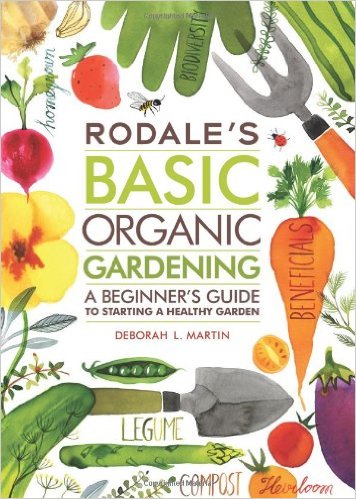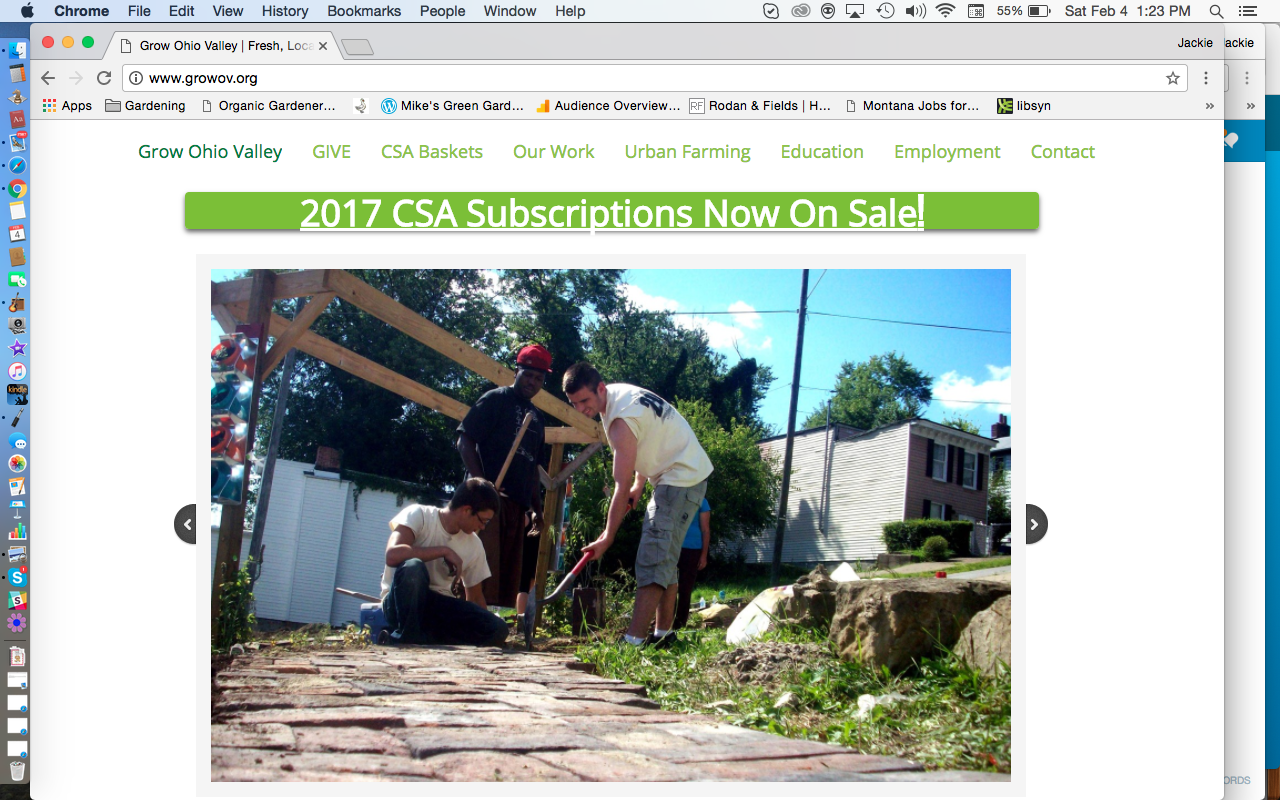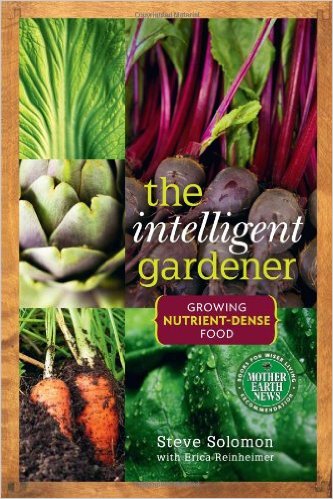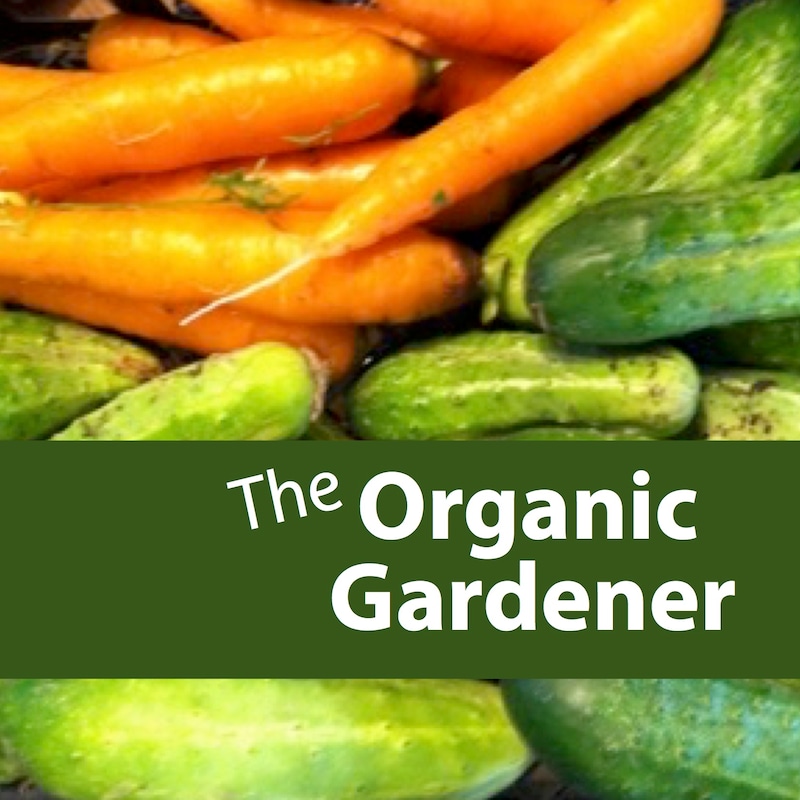
Shownotes
It is Monday, January 2nd, very early in the morning and I am headed back to school today. I know you are going to love this guest from Black Swan Organics and Grow Ohio Valley in Appalachia!
What a great guest to follow up after Jean-Martin Fortier because Danny is basically doing everything JM Talked about. A great educator and farmer you are going to love this episode as much as I did!
Grow Ohio Valley.org is a nonprofit organization working to improve food justice in Appalachia.Grow Ohio Valley is working to fashion a new economic landscape, one offering increased prosperity, improved health and a better environment.
Things they do is change:
• Vacant city lots become fertile and productive.
• School children who think it is “normal” to grow and eat healthy food.
One thing I am curious about is their “Food Stamp Challenge”
 From Black Swan Organics andGrow Ohio Valley here’s Danny Swan.
From Black Swan Organics andGrow Ohio Valley here’s Danny Swan.
Tell us a little about yourself.
Sure, I’m living here in Wheeling West, VA. It’s kind of hybrid Appalachia Coal town and mid west Rust Belt town. Has a lot in common with some of it’s larger brothers, like Cleveland and Akron. Had lots of steel mills which have largely gone away and coal mines, that are dwindling, kind of post industrial situation.
I grew up about an hour away, and I came to live in the big city about 10 years ago. At that time kind of found a love for organic gardening trying to share that with other people since in a variety of ways.
Sharing the Love
One of which is Grow Ohio Valley, a company founded with other people here in Wheeling, West VA to bring this local food movement, which is pretty fringe here. You’d call it a rust belt climate….
What does that mean a rust-belt climate?
Wheeling, it’s been a hard up town. It was pretty prosperous up until the 60s and 70s and before. As factory work moved overseas, and as coal ran out or other forms of jobs, there are:
- high unemployment rates
- everything that goes with that
- poverty
- low scores on health performance
- low educational performance
- high drug usage which is a big thing we’re seeing right now.
It’s a kind of mentality where people just want a job … want things to get back to normal as they remember it … so things that relate to long term health, don’t get on the radar screen I would say, if you look at it as an average across the town as it is in other places as frequently.
People are
- not thinking about farmers markets
- not thinking about organic food
- growing own food
more immediate and pressing concerns … way to address these concerns … direct these …. business opportunities in farming and gardening …. that’s the obvious one …. under employed to do something… either a backyard garden to support their home …. economics or kind of a market venture like were up to here…. there’s also that empowering energy that comes with doing something that is live giving for your and your family … putting your flag in the ground that you have control over … something I have power in in this sort of complex challenging world… for decades now…
We’re in a similar situation because the timber industry has left and our mills have shut down. I think that this is a popular topic whether they are interested in creating their own green jobs or supporting their farmer’s market.
Tell me about your first gardening experience?
My mom had a small flower – vegetable garden, my grandfather was a farmer and I spent time as a kid … but it was all sort of part of the background as a child and not something I had a keen interest until I moved out and had my first backyard. I had a friend he was interested in trying a vegetable garden, we were living together and we just went out in the backyard, dug up some grass, and planted a few seeds and I was hooked … you probably understand as well as your listeners….it’s hard to describe … what a feeling! I haven’t thought about much else…
How did you learn how to garden organically?
Rodale Organic Gardening Book Basics …
No, we just went down to the used bookstore, and got a guide to Rodale Organic Gardening Book Basics …
… that was really the beginning for me… I didn’t really know anything, I had just kind of taken orders how to help in the garden … I hadn’t really thought about!
But what a great book! It gave me some methods and ideas.
I love Rodale’s, I was just looking at some of my Rodale books the other day, my herb book and my perennial book … Do you want to explain what Grow Ohio Valley is?
Let’s see it was 8 years ago, I was working in an inner city after school summer school here… basically the after school program for the poor kids… at this great place called the Lockland Chapel … working there, my job while I was in college …
I just wanted to get the kids outside and off the concrete, looking back at my childhood I wanted to give them a taste of the things that were important to me and having a connection to the natural world… rode our bikes around, settled on one, found a vacant lot, dug up a little land on this lot and growing a few tomatoes … later on we found out someone owned the property – the Department of Transportation and they formalized our permission to grow things there and that sort of started out my beginning of doing community gardening in a community engaged sort of way.
We took the kids down there and just did some fun stuff … we didn’t have a curriculum and we just wanted to let them run around and do that sort of thing…
The first year we took the boys down and take one chunk and grow some pumpkin seeds and the girls had a different plot and held a little competition see who boys or girls could grow bigger pumpkins. They really got into it, wheelbarrowing manure around and stuff.
At first I was skeptical, they were looking at the grass wondering is this gonna get grass stains on my Nikes etc but soon they loved it …
I just had to ask what age kids? Middle school or older? I teach 2nd grade…
At that time I had 2nd to 5th grade kids, but shortly after I took middle school to high school… this was a corner of a big vacant lot – about an acre … size of a football field.
Once I got into the high school, kids who could do al little bit more and more of the lot… down the road… We have chickens there… still do, perennial patch with blackberries and rhubarb and annual vegetables … I have these middle school and high school boys
mostly boys…
They were out there helping me all the time… they wanted to make some money, said these vegetables have some value … so every Saturday we started taking to the Woodville Farmer’s
That’s when I started my intensive education on Market gardening
- efficient production
- holistic soil and health…
So starting with your market gardening education. If you were starting over today, what is one big thing you would do differently?
So many things wrong, it’s been part of a fun and interesting journey… doing one thing because doing things wrong one farmer shows up … your doing something wrong and that attracts people… I have this weird theory…
Determined incompetence…
It’s really attractive to people because when you don’t know what your doing but you really want to do a good job… people who know what their doing start showing up … brought so many interesting people … so many mentors who saw what we were doing here in the city and wanted to help people to succeed so great relationships started out of that… so I am not sure I would go back and go to ag school or do something like that.
There have been some resources since that Rodale Organic Gardening Book Basics that have been super valuable to me…
These are the kind of things on my desks all the time that I’m referencing
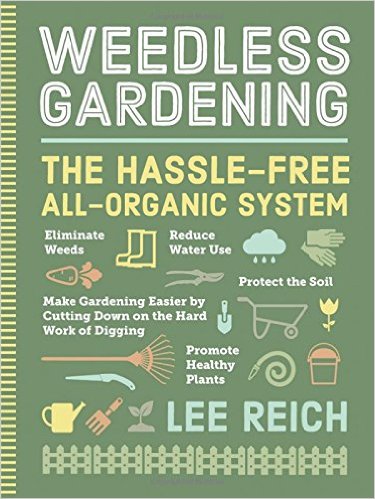 Lee Reich? Weedless Gardening… and several other books with the same theme of no till gardening, which proved to be really important to us, kind of lifesaving on our innercity lots… all these vacant lots used to have houses on them… so we’re lucky if the demolition contractors spread a few layers of topsoil that’s still laying in the basement under your feet.
Lee Reich? Weedless Gardening… and several other books with the same theme of no till gardening, which proved to be really important to us, kind of lifesaving on our innercity lots… all these vacant lots used to have houses on them… so we’re lucky if the demolition contractors spread a few layers of topsoil that’s still laying in the basement under your feet.
tilling the garden after we broken three rototillers so we realized we had to find a better way.
No Till Gardening
opened us up to no till gardening … coming form a permaculture garden…
 Ruth Stout of how to garden without an aching back…
Ruth Stout of how to garden without an aching back…
to becoming a really dedicated mulcher who never tills and just cultivates the soil…
That was a gift to us and another farmer and really changed things and probably what gives us where we are and allowed us to be successful to be doing this now…
lately new info coming in from
Steve Soloman and Erica authors of the Intelligent Gardener
I’ve heard of the No-till method who first started out with Jon Moore in Australia ….
- really great resources
- the one I was talking about is a really quick read
- novella size book that fits in your pocket.
- light on technical jargon
- user friendly
- could hand to the high school kids and they could wrap their heads around it…
- more production gardening
Little Tweaks Add Up
We’ve expanded to four lots of intensive production here in the city. That making little tweaks and little changes can really mean a lot if you can get 10% more production, if it’s a big enough garden space that can be really meaningful… sort of economics in a community if you plants can be a little bit more efficient and productive it can be really crucial!
soil science info
about how to balance micronutrients and minerals, learning about he soils
cat iron exchange capacity… 3 pathways by which can find nutrients
which have we been paying attention and which have we been neglecting…
This book the the Intelligent Gardener really comes in handy. It’s basically a soil science 101 primer coming from people who are life long organic gardeners themselves.
I’ve really appreciated what it comes from.
Nice I’m so curious about a lot of what you are talking about…
So I teach on a Reservation there’s a lot of similar burnt down houses etc… just sitting there… so you’re not even removing the old houses etc… You’re just building right on top of it.
a lot of words for it
- sheet composting
- sheet mulching
- lasagna gardening
a lot of terms for what we’re doing
Lets say you start with just plain grass in your backyard… patchy grass, whatever you’ve got, let’s say it’s a building demolition site kid of rubbly or grassy.
First thing you need to do is get rid of the grass … normally this would be done with a plow or a rototiller or a shovel, however your gonna get rid of the grass… but instead of doing this we we lay newspaper or cardboard something biodigradeble to starve the grass of any light. We use string to lay out the corners, then inside that area we lay newspaper or cardboard on top of all the grass. On top of that newspaper of cardboard we throw any kind of organic mulch, anything we can get our hands on
- leaves
- mulch
- manure
- chicken
- compost
- anything at all to cover up cardboard or newspaper
and then wait a month and the grass is dead underneath, not dead but just in a passive way… root structures are not disturbed
plant matter is decomposing right into the soil
soil life, especially earthworms, are very happy in an environment that’s moist and dark and not being disrupted. They’re tunneling through the whole thing brining it down and bringing this organic matter that you have put on top of the cardboard they are grabbing it and carrying it down through the soil.
In a very short order
not as short order of if you had a rototiller of course but in a few months of this you start getting a nice soil tilth. Soil that you can move though your hands and break it into different clumps.
After a few more years from this, after adding lots of mulch.
We are always adding mulch if a lawn care company drops off some grass clippings they go straight into one of the garden beds! We’re always adding mulch so we can never see bare soil… bare soil is sight unseen at least that’s our goal in the garden!
By adding that mulch and the bottom layer decomposing and adding more mulch on top and always doing that, we build up a really thick layer of organic matter that is mobile that gets transported down through the various soil levels by the...
